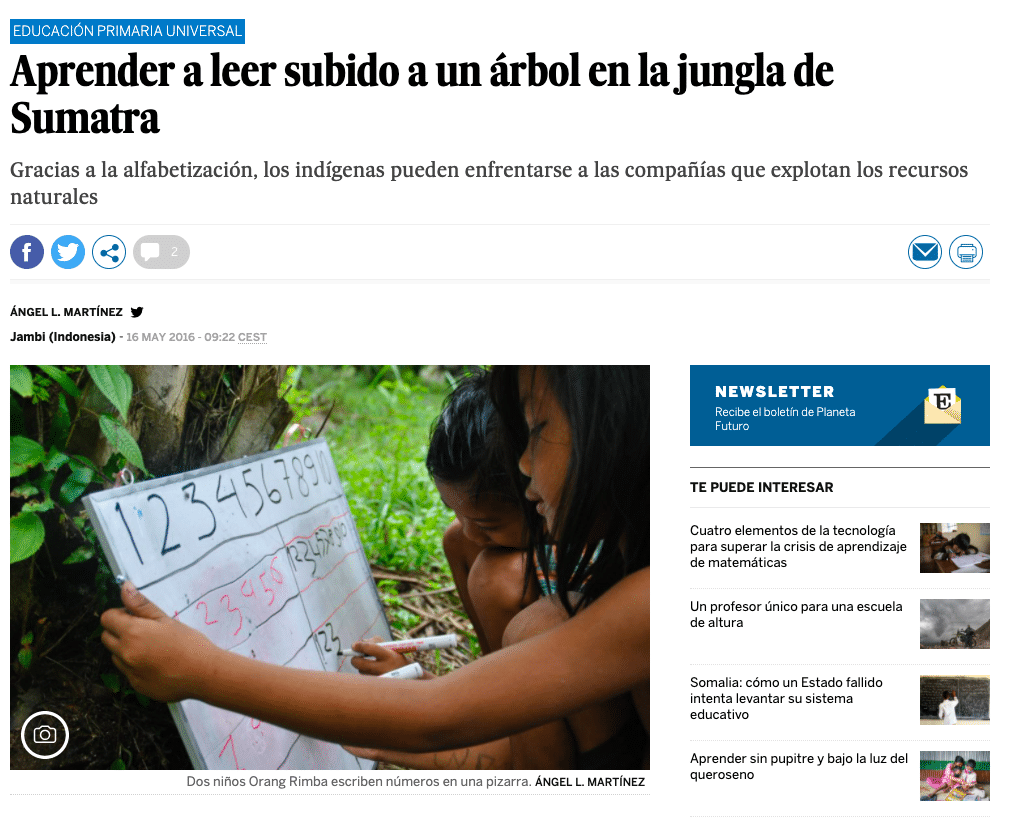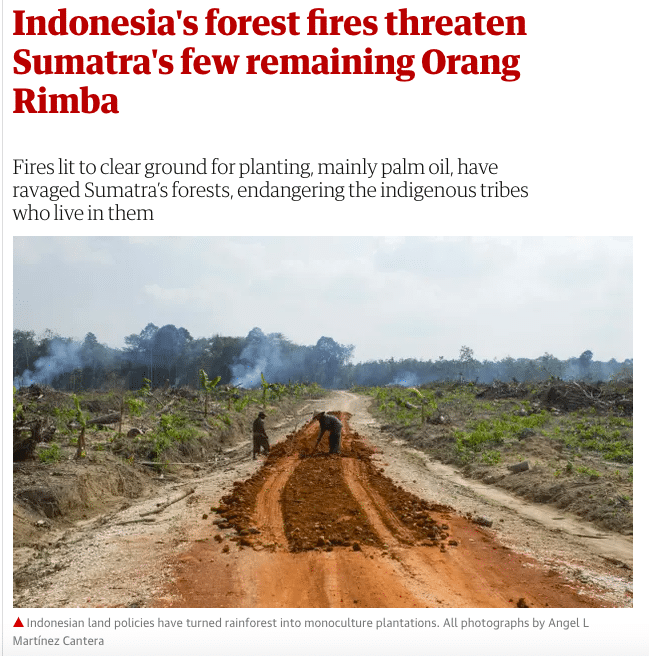At first glance, content writing and journalism may seem to be two distinct disciplines. But upon closer examination, they have quite a bit in common—journalism is a type of writing, after all. And content writers of all kinds can learn a lot from journalists’ work.
Both professions involve writing stories that aim to reach as many people as possible, and highlight the importance of linguistic choices, real-world context and diverse perspectives.
With these similarities in mind, I decided to compile some lessons that content writers can learn from journalists, from writing engaging headlines to mastering the art of the pitch.
Expert insights from a VeraContent team member

I was inspired to explore this topic by Ángel Martinez, a member of the VeraContent freelancer network who also works as an international reporter.
He recently delivered a skill-sharing session based on his experience in both journalism and content writing, in which he explained how the two fields overlap and inform one another.
I found Ángel’s story incredibly interesting and relevant, as each of his writing tips and techniques could easily be applied to my work as a content creator. In this article, I’ll share some of the key takeaways from his talk.
Lessons learned from a career in international journalism
1. It’s never too early—or late—to start your career
Ángel was just a teenager when he started writing articles that exposed the faults of people in power and shed light on often-ignored issues. When he was 17 years old, he wrote a piece for the local paper of his town in Andalusia that criticized religious institutions for exhibiting extravagance in processions and parades.
The newspaper received many calls from readers demanding to know why a 17-year-old had been published in the paper. But the editor stood by him and defended his article, despite his age and the public’s complaints.
The lesson?
Anyone, regardless of their age or prior experience, can tell engaging stories. Don’t let what other people say hold you back from creating content that matters.
2. Firsthand experiences make the best stories
Following his dramatic entry into the world of journalism, Ángel continued to seek out unusual and controversial stories. In 2008, he wrote his master’s degree dissertation on the Western Sahara conflict.
While working for a London-based NGO, Ángel visited several Sahrawi refugee camps in Algeria and saw the conflict’s repercussions with his own eyes. He documented this trip in his first articles for national publications, which launched his career as a journalist.
Remember, no matter what client you’re writing for, it’s always best to write what you know—even if that means going out of your way to gain firsthand experience.
3. Storytelling knows no boundaries—or borders
Ángel will be the first to tell you that a nomadic lifestyle can take your career to the next level. In 2013, he traveled to India to research articles for Al Jazeera and El País. The trip was meant to last three months, but he ended up staying much longer.
During this time, Ángel traveled across South Asia to write stories for The Guardian, Al Jazeera, Vice News, The Diplomat, El Mundo and more. In 2017, he settled in Mumbai as the Indian correspondent for El País, El Confidencial and Radio France International, while also freelancing for VeraContent and various news organizations.
This proves that to be a successful writer, you don’t have to move to New York or London. In fact, a flexible lifestyle that includes travel and exploration can actually enhance your craft, as it opens you up to new experiences, perspectives and learning opportunities.
See also: Going freelance to pursue your creative aspirations

Common misconceptions about journalism today
4. Jack of all trades does NOT mean master of none
Everyone has their own interests and areas of specialization, but it’s always good to diversify. Versatility is pivotal in the modern media landscape, as most projects often involve many different issues and fields of expertise.
To tell these kinds of stories, journalists need to have vast knowledge of the world and contacts in many different areas. Likewise, content creators have to be able to adapt their writing to cover any topic, in any industry and on any channel.
Whether you’re writing investigative articles, branded content or anything else, flexibility and adaptability are essential.
Seek to gain familiarity with a wide range of topics and formats—you never know when an obscure fact or unique experience will come in handy.
5. A picture is NOT always worth a thousand words
With the rise of social media and entertainment news, sometimes it seems like visuals are the gold standard of content creation. But when you’re dealing with complex issues, you can’t rely solely on images to tell a story—you also need well-crafted words.
When presented out of context, images can easily be misinterpreted or even manipulated. That’s why you should always accompany visual aids with captions and detailed explanations of what they represent.


Consider these two photos of Prince William. From one angle, he appears to be making an impolite gesture. From another, it’s clear that he’s holding up three fingers—not one.
If an article were to feature the first photo without including the second or explaining the confusion, it would be misleading and inaccurate.
As a journalist or content writer, you must take the time to understand the context of every image you use, and ensure that its meaning is clear to your audience.
6. The social media revolution is NOT the end of journalism
As social media networks foster the spread of fake news, it might be easy to assume that the days of fact-based reporting are over. It’s true that the traditional newspaper industry is in decline, but that doesn’t mean journalism is dying.
In truth, modern technology and social media have made quality reporting more accessible than ever. You don’t have to wait for the paper or flip through a magazine to find the most up-to-date information; it’s always right at your fingertips.
But in order to take advantage of this access, the audience needs to be able to distinguish quality content from the crowd of clickbait and thinly veiled ads.
Journalists and content creators can make this easier by producing well-researched, carefully crafted pieces that uphold the tenets of accuracy, integrity and honesty.
See also: How Shaheen Samavati transitioned from journalism to entrepreneurship
7. Journalism’s worst enemy is NOT censorship—it’s lack of support
Censorship is certainly an important issue, but it’s far less common than the widespread failure of institutions and governments to support the essential work of journalists.
Oftentimes, bureaucracy and indifference can place nearly insurmountable hurdles in front of journalists’ work. This can lead to discouragement and even self-censorship, as writers are forced to adapt to an unsupportive industry.
This challenge is also present in the world of content creation. If an aspiring writer keeps hitting roadblocks and getting rejected, they might eventually give up.
But if someone takes the time to give them constructive feedback and help them improve, they can grow into a professional who provides real value to audiences and clients. That’s why it’s vital to support others in your field, whether through mentorship, training or peer-to-peer support.
We have to work together to create spaces where journalists and content writers are free to do their work without unnecessary limitations.

Key writing tips from journalism that apply to content creation
8. Be quick and clever
Quick thinking and creativity are crucial for success as a journalist—and as a content writer. When navigating uncharted territory, sometimes you have to be resourceful and take risks.
Ángel told us how he once wanted to pitch an article to a publication, but didn’t have any contacts there. He called its publicly available phone number and claimed to know the editor personally. This allowed him to secure a meeting and eventually to get his article published.
While it’s true that Ángel had to lie to accomplish this, it exemplifies the quick thinking that many young journalists need to master in order to get recognized and launch their careers.
Sometimes the most effective content is based on a simple, quick-witted comment or campaign; never underestimate the power of a crazy idea.
9. Repurpose your content
For brands, repurposing content is a great way to maximize the value of every blog post, video and event. But it’s also a sound strategy for writers and journalists to make the most of every idea.
Ángel often finds several angles on the same story, allowing him to publish in multiple places by writing from different perspectives.
To demonstrate this, he presented two articles he wrote about an indigenous tribe on the Indonesian island of Sumatra: one for El País and the other for The Guardian.
Both articles explain how the exploitation of natural resources harms the community. But one introduces the issue through the lens of local literacy programs, while the other describes the effects of forest fires on Indonesia’s palm oil industry.


When it comes to content creation, writers can make the most of each piece of content by repurposing it for different channels and audiences. This skill is increasingly valuable as brands expand to different digital formats and platforms.
10. Master the art of the pitch
All journalists know that editors are busy people with high expectations. When pitching a story idea, they have to make it quick and convincing. This takes initiative and creativity, plus a solid understanding of the needs of each publication.
The best journalists know how to calibrate each article to the editorial voice of a particular publication. Ángel often knows who he’s going to pitch each story to from the outset, which informs his research and writing process.
As a content writer, you’re also going to have to sell people on your ideas. Whether you’re making proposals to potential freelance clients or seeking approval from your supervisor before beginning a project, you have to master the art of the pitch.
Always tailor your message to the person you’re pitching to, and do your best to be clear, concise and confident.
See also: Things no one tells you about freelancing in Europe

11. Write compelling headlines
The importance of a good headline can’t be overstated. It can totally change the impact of an article, as it’s the first thing people see. For news headlines, it’s essential to include the most important and attention-grabbing information.
This also applies to content writing; the headline is your first chance to draw the audience in and make them click or keep reading, so it should never be an afterthought.
As Upworthy co-founder Peter Koechley once said, “When we test headlines we see 20% difference, 50% difference, 500% difference. A really excellent headline can make something go viral.”
The key to creating an enticing headline that doesn’t sound like clickbait is to understand your audience and what they care about, so that you can grab their attention from the outset.
12. Optimize your interviews
Interviews are the best way to get firsthand insights and insider information, making them a mainstay of journalistic work. When conducting an interview, you have to be empathetic to your interviewee’s situation and open to their perspective, while also remaining objective.
Most importantly, you must leave behind your prior knowledge and let the interviewee speak freely—you’re there to learn from them, not vice versa.
Interviews can also be a valuable way for content writers to become familiar with a topic and incorporate expert insights into their work. Use them to increase your expertise and expand your horizons, while always maintaining empathy, respect and professionalism.
Final takeaways from the world of journalism
Ángel’s story provides a fascinating glimpse into the life of an international freelance reporter, and serves as a reminder that many of the tenets of journalism are also relevant to content writing.
An enormous amount of effort and skill goes into creating quality content, whether its goal is to inform, persuade or drive an audience to take action.
The more you embrace the tools and strategies of journalistic writing, the more you’ll be able to engage with your audience and achieve your targets—whatever they may be.
Looking for more writing tips?
- Writer’s block, procrastination and burnout: Tips for times of trouble
- The most in-demand types of digital content for 2021
- Why feeling uncomfortable can make you a better writer
- How to write an advertorial that drives sales

